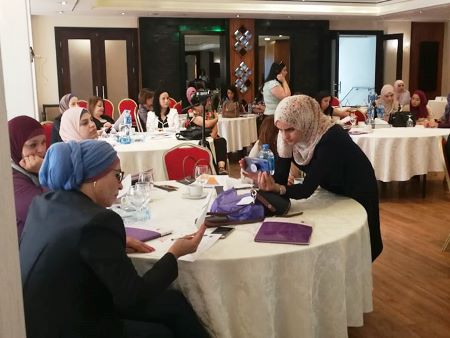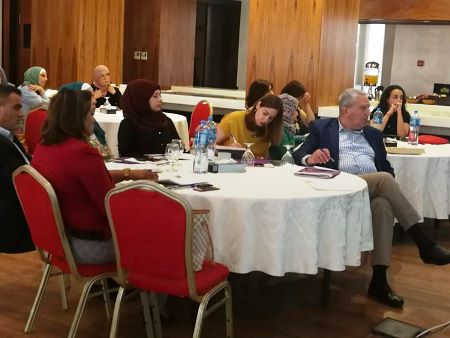|
MIFTAH holds a hearing session on obstacles to ratifying Family Protection Bill
Ramallah – On June 27, MIFTAH held a hearing session in partnership with the Palestinian NGO Forum to Combat Violence against Women- Al Muntada during which official and civil society parties listened to the reasons for the continuous postponement and delay in ratifying the Family Protection Bill. The session addressed how this created challenges which impeded the course of ending violence against women in Palestine. This session is part of MIFTAH’s interventions within its “Gender Equality and Women’s Empowerment” project, which it implements in cooperation with and support from UNFPA. The hearing session was opened by MIFTAH Board of Directors representative Yousef Dajani, who stressed on the strategic approaches of the institution in promoting a legislative environment and influencing public policies that will protect citizens’ rights for everyone. He focused on MIFTAH’s contributions as part of civil society’s efforts to combat violence against women, saying the aim of the hearing was to shed light on the reasons for the delay in ratifying the Family Protection Bill. Dajani explained that this was one of the first Palestinian laws to contribute to ending violence in Palestinian society in general and violence against women in particular given the absence of solid and deterrent legislation that offers protection and justice for Palestinian women and girls. He also pointed out that the essence of the Family Protection Bill is basically to preserve the unity of the family and to guarantee legal procedural support to safeguard the best interests of all family members. This, Dajani said, reinforces the concept of social protection in Palestinian society. In his speech, Dajani stressed on the need to adhere to constitutional and legislative channels in dealing with the ratification of laws and legislation and work according to the democratic principles MIFTAH seeks to promote and to stress on these as components of the political system. However, he added, this should also correspond with addressing the developments of this phase and remaining abreast with social issues that need reform, including decisions that address issues which affect citizens’ security. At the outset of the meeting, the results of the survey on the extent of application of the national referral system for battered women, were presented along with the challenges to it. This revealed problems in the system’s application, follow-up and evaluation of some procedures pertaining to offering services to battered women in the absence of legal legislation for protection from violence. This was followed by presentations that corroborated the need to review the current legislation, policies and laws in institutions to guarantee the application of the system according to legal legislation, to expedite ratification of the Family Protection Bill and afford attention to providing the necessary support and building the capacities of those working within the referral system. The session hosted speakers from the Ministry of Justice, the President’s office, the General Union of Palestinian Women and the NGO Forum to Combat Violence against Women. Suad Melhem from the general administration for legal research affairs at the Ministry of Justice presented the efforts towards ratifying the law in addition to the obstacles hindering it after taking into consideration all notes and comments in this regard. In addition, a technical committee was formed overseen by the Fatwa and Legislation Bureau, which will begin work soon. In her presentation, Melhem confirmed that the Ministry of Justice has been working for seven years within the jurisdictions of the compatibility committee for ratifying the law. She said after they finished the draft, they sent it to the President’s office for ratification. Notes and amendments were put on the draft by Ali Muhanna, the President’s legal advisor before it was sent back to the Ministry of Justice and to all institutions and commissions that contributed to its formulation for redrafting in line with the comments and observations put down by Muhanna. Finally, a ministerial committee was formed that includes all regulating parties for the bill, headed by the Fatwa and Legislation Bureau, to redraft the law according to the new proposals. On her part, head of the legal affairs unit at the President’s office Randa Karkar said in her presentation: “This project is part of efforts to harmonize with international conventions on human and women’s rights.” After review of the bill by the Council of Ministers, the following comments were added: One: the bill’s lack of an explanatory memorandum explaining the reasons for this law and the importance of its ratification Second: There is a need to highlight the social necessity for this law Third: In spite of the importance of combatting domestic violence through clear preventative and precautionary policies, a punitive nature still prevails over the law. Fourth: The bill is full of ambiguous terms and inconsistencies between the title of the bill and its content. Fifth: The bill offers nothing new in terms of precautionary and preventative measures except ensuring that these tasks and powers are within the jurisdiction of the Ministry of Social Development. Karkar continued: “We all stressed on the importance of this project and the many important comments made to it, especially regarding several provisions and some definitions pertaining to domestic violence. The assumption was first that it involved only the family, but then they took into consideration all of the notes and held a policy meeting with the President’s legal advisor, the Minister of Social Development, the Ministry of Women’s Affairs, the Chief Justice Bureau and the Fatwa and Legislation Bureau. This was followed by the formation of the technical committee to review the notes and comments on the law. The committee will begin work shortly.” Meanwhile, Sabah Salameh from the NGO Forum to Combat Violence against Women addressed the reasons hindering ratification of the Family Protection Bill, the draft of which was presented 14 years ago and which has been running in circles ever since. “Even though the Forum was content with the law, we had aspired for a law that largely coincides with international conventions. Our satisfaction with the law oscillated between 70%-80% but today we see it has gone nowhere. Now we are hearing it is being put to discussion again by the Fatwa and Legislation Bureau even though this is the fourth time it is sent back to this office,” Salameh said. “Is the Chief Justice a legislative authority? This is a question we want an answer to. The information we have about the comments on this bill are not just from the President’s legal advisor but also from the Chief Justice and from the Ministries of Justice and Social Development.” Salameh continued that since the beginning of 2019, the Forum expanded the circle of participation in demanding expedition of the Family Protection Bill ratification by launching a national campaign, which addressed civil society organizations, the General Union of Palestinian Women, rights institutions and rights activists. It also organized workshops and meetings in community centers and in town and local councils in all districts and even in universities to pressure decision makers to expedite ratification of the law. To this end, a demonstration is being organized for July 29 in both the West Bank and Gaza Strip.
 Haitham Arar of the General Union of Palestinian Women said in her presentation that the demand to ratify the law is not an issue of luxury or of implementing international conventions as much as it is about responding to an urgent need in our society. She maintained that violence has escalated to the point of including all family members, including those with special needs. “GUPW and the NGO Forum to Combat Violence, which includes several Gaza Strip-based women’s institutions, are working with the government to speed up the ratification of this law; hence the suggestions we proposed to the various committees were based on a consensus between all components of the women’s movement. We want a law that protects all members of the Palestinian family, including the perpetrator, because this perpetrator will eventually return to their family. “ Arar continued that the two basic committees for expediting the law’s ratification were currently cooperating with each other: the gender committee and the compatibility committee. She said they presented a memo that included detailed notes on the approved draft of the bill and participated in discussions over it. “We also followed-up the government measures in this regard through recommendations from the compatibility committee sent to the Council of Ministers and then to the President’s office. After that, however, we were surprised that some parties said they had comments on the draft. It is not that we have a problem with these comments, but we do have a problem with the Chief Justice Bureau, which claimed it was a reference for women, first, and that it was a legislative party, second. The Chief Justice has every right to express his comments, but his bureau has no right to dominate over the legislative authority.” Arar concluded, “The law took into consideration all the government’s legal measures until it reached the President’s office, which means it is ready to be signed. There is no excuse for it to go back to the government or for the formation of a technical committee. It should be signed immediately without delay, especially since the ratification of the law was part of the 100-day plan of the new government.” Recommendations The recommendations called for the topic of disabilities to be included in the final draft of the bill, which needs a legal, legislative plan to be ratified. They also called for adopting an executive apparatus for this purpose and adopting action strategies on the ground to push for ratification of the Family Protection Bill; to adopt a prototype for legislation pertaining to women’s rights and not back down from it; to establish mechanisms of protection, procedures and a legislative framework on which the law must be based, with emphasis on the nature of the law, which must be protective and deterrent; to reconsider the management of resources in an effective and creative way given there was a demand for the need to draft a memo that determines the positions of all parties in regards to the law; the need to involve civil society in the technical committee and demand for its ratification. MIFTAH project coordinator Hanan Said, said the session was part of MIFTAH’s efforts to provide the necessary environment for dialogue between official parties and civil society so they could discuss issues pertaining to gender-based violence. This, she said, also includes proposing alternatives and solutions to impact relevant policies and laws to reduce violence in Palestinian society. In addition, Said maintained the need for discussing the necessary tools and measures to provide protection for battered women to promote their access to justice and socio-economic empowerment.

http://www.miftah.org |